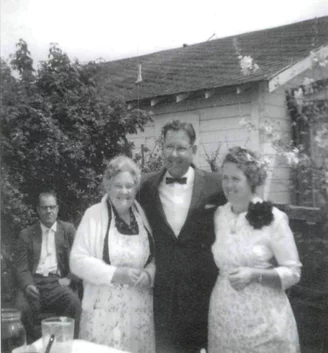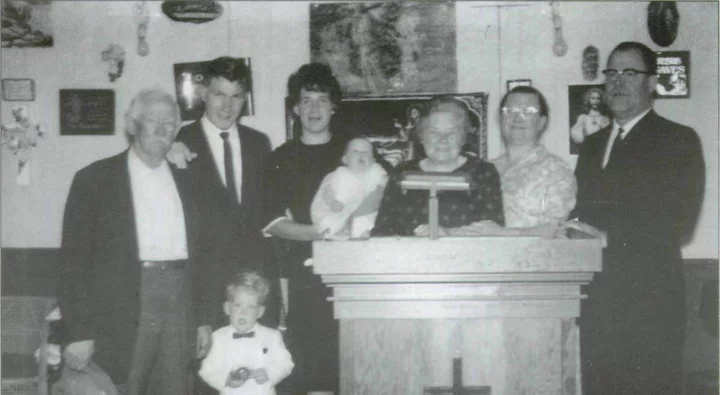A picture taken at the Little Chapel shows, from left: LeRoy Beeman, Mr. and Mrs. Davidson and their children, “Mother” Austine Fernleaf, Delia Bean and Darrel Bean. Photo courtesy Darrel Bean, via the Humboldt Historian.
In the 1950s, 1960s and 1970s a mission for the homeless and other less fortunate people named The Little Chapel was located on First Street in Eureka. Below the large letters that proclaimed its name on a neon sign was another phrase: “For there was no room for them in the inn.”
Although this humble establishment was not one that attracted much attention, it was a source of hope and encouragement to the clientele who received a hot meal and a clean bed for the night completely free of charge.
As one entered The Little Chapel the heartening smell of soup or stew was immediately present.
Once a waterfront saloon, the dining room welcomed all unfortunate people. The old bar, still there with its full-length mirror, served as a dining counter where people could sit on old bar stools while eating. On special holidays like Thanksgiving and Christmas a full turkey dinner was always served.
The chapel itself seated about thirty people. Another room was used as a dormitory, filled with about twenty double bunk beds. Clean used clothing, socks and shoes were also available.
The pastor and founder of the Little Chapel was an elderly lady named Austine Fernleaf, but she was known to one and all as “Mother” Fernleaf. This humble, soft-spoken lady was held in such high regard by the Eureka City Council that it often invited Mother Fernleaf to open its meetings with prayer. She was also a member of the Eureka Ministerial Association.
Mrs. Fernleaf had raised a family of 10 children of her own. One of her daughters, Mary Vagle, and her husband, Joe, helped in the beginning years of the chapel’s existence. But Mother Fernleaf held the position of spiritual leader until old age forced her to retire when she was around 80.
The chapel operated on faith and thrift. No offering baskets were ever passed around in the services, even though people from local churches visited nearly every night. A box with a slot cut in its top was located on the back wall. This silent container reminded those who “could” that the mission depended on freewill offerings for financial support. Mother Fernleaf was careful to cut costs whenever possible. She even took all the dirty laundry home with her, including the linen from the bunk beds.
Besides the “street people,” many stranded or down and out families often came for help and were never turned away.
The work of cooking, cleaning and serving was done by a staff of two or three men. These men had come to The Little Chapel for help and had stayed on, working for room and board.
Numerous testimonials could be given of others who had found a changed life in this little out-of-the-way chapel. My wife, Delia, and I served as assistants to Mother Fernleaf for six years, from 1958 to 1964, and we became familiar with many stories. Two of these merit special mention.

From left: Darrel Bean (seated), Mother Fernleaf, Joe Vagle and Mary Vagle, the daughter of Mother Fernleaf
LeRoy Beeman was 83 years old when he first came to the Little Chapel, This old gentleman had a very interesting history. He was a Spanish-American War veteran. Later he served as a U.S. Marshal in the Indian Territory before Oklahoma was a state. He also served as Indian Agent to the Kickapoo Nation. Among other duties, he said he had on several occasions delivered criminals to the infamous “Hanging Judge” Parker at Fort Smith, Arkansas.
In another period of his life, LeRoy Beeman said he had worked with two of his brothers in a print shop in McCloud, Oklahoma, where they published the local newspaper. He reminisced how, when he decided to quit chewing tobacco, he nailed the plug of tobacco on the wall and wrote a caption underneath that proclaimed, “Crucified.”
Despite his decision to quit, he would pinch off small bits from the plug when he thought his brothers weren’t looking. His brothers found out what he was doing, and dipped the plug in the acid solution that they used to clean the type in the print shop. LeRoy’s mouth became so sore he had to stop sneaking tobacco for good.
In later years, LeRoy came to Blue Lake and served as city clerk for some time.
At age 83 he was diagnosed as having a hole in his diaphragm. Doctors at the Veterans’ hospital in Vallejo advised him that he had a short time to live, and that he should settle his affairs soon. LeRoy, who had always been an avowed atheist, began to wonder if he had been wrong about the value of religion. He visited several churches but didn’t feel comfortable. Then he remembered Austine Fernleaf, who had once founded a church in nearby Korbel. After learning she was now operating a little mission in Eureka’s “skid row” area, he found its location. There, he reported, he not only discovered spiritual peace, he was healed from his physical affliction.
Beeman lived for another 17 years, faithfully attending nightly services at the mission, and testifying about his amazing experience. When others scoffed and called him a liar, he would say, “I don’t care whether you believe it or not. It’s true anyway!” Shortly after his hundredth birthday LeRoy Beeman died at the Veterans’ Hospital in Vallejo.
Another regular attendee at The Little Chapel was Bill Early. A well-known Eurekan who rode the ferry across the bay to work for the Hammond Lumber Company, Bill was a confirmed bachelor who eschewed cars to walk very spryly everywhere he went. During the 1930s and ‘40s he led a popular song and comedy act called “The Samoa Nuts,” which performed around the Eureka area.
The Bill Early stories are endless. Local oldster Bill Inskip recalls sitting at the bar of the Varsity Club in the long-gone Revere Hotel in Eureka’s Old Town. He heard a loud war whoop and turned to see Early standing on his hands in the doorway with an alarm clock tied to one arm as a wrist watch. Already about two sheets to the wind, he walked across the room, still inverted, propped his feet up against the bar, and yelled, “Ain’t anyone gonna buy me a drink?”
With everyone roaring with laughter, and his feet still draped over the bar. Early then went into his patented sales pitch for “Professor Pumpernickle’s Pink Pills,” followed by other sure-to-win-a-drink acts.
After years of wild behavior. Bill Early is said to have found a life-changing experience of faith one night at the Little Chapel, and it became his church for the remainder of its existence. During services he would stand with a huge smile and tell of his change and how he had poured bottles of whiskey down the sink and never touched it again.
The Little Chapel has faded into history. But in my mind’s eye I can still see Mother Fernleaf standing behind her pulpit, tears flowing from her eyes as she spoke her message to the dirty, unshaven and sometimes drunken people. Her heart expressed love for every one of them, and they knew it.
###
Ed. note from 2024: Back issues of the Humboldt Standard put The Little Chapel at 322 First Street. The building that bears that address today is certainly not The Little Chapel.
###
The story above is from the Spring 1999 issue of the Humboldt Historian, a journal of the Humboldt County Historical Society. It is reprinted here with permission. The Humboldt County Historical Society is a nonprofit organization devoted to archiving, preserving and sharing Humboldt County’s rich history. You can become a member and receive a year’s worth of new issues of The Humboldt Historian at this link.

CLICK TO MANAGE